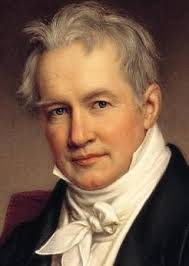Alexander Von Humboldt
Country
Prussia
Birth - Death
1769 - 1859
Occupation
Scientist
Description
Alexander von Humboldt was a naturalist, explorer, and scientist who is credited for having created the field of Geography as a distinct and explicit area of research and teaching. His scientific interests in this field began at an early age when he collected plants and insects. This interest grew significantly with his love of travel in his youth. Humboldt’s education focussed on preparations to become a scientific explorer, including studies in astronomy, languages, anatomy, biology, and the use of scientific instruments.
After a series of political appointed jobs, the death of his mother gave him the funds to pursue his passion for travel and scientific exploration. His first trip in 1799 was to the newly discovered Latin America and South America regions, including Cuba, Colombia, Mexico, and various Caribbean islands.
This specific trip laid the foundations for the creation of the scientific study of geography. Von Humboldt developed the idea and means of using isothermal lines to delineate different climactic zones, all based on elevation levels. This, in turn, lead to his study of the geography of plants based on those climactic zones. Importantly, von Humboldt discovered the different ranges of strength of the earth’s electromagnetic field as one travels from the equator to the poles of the earth. He further studied and mapped the currents of South America, and was the first to relate mountain sickness to a lack of oxygen as one ascended.
In the process of laying the foundations for this new field of study, von Humboldt stressed the application of scientific method. Previously, much of the informal thinking and research around issues of geography and botany were based on doctrine and religious beliefs – hence the naming of plants, for example. Through the extensive collection of data from his trips, von Humboldt was able to amass a tremendous catalogue of information that could be analyzed to determine the scientific cause-and-effect relationships in the physical sciences. Von Humboldt placed great emphasis on quantitative methodologies using the most advanced scientific instruments of his day.
Von Humboldt’s findings put him a position of respect. He became a member of the Royal Swedish Academy of Sciences, the American Academy of Arts & Sciences, a royal chamberlain of Prussia, an honorary Mexican citizen, and more.
Von Humboldt is particularly noted for his five-volume series of books titled Kosmos. This is a complete collection of his writings on geography and the natural sciences. This work popularized the subject of geography with the general population. His public lectures were so popular that larger assembly halls were continually sought out to accommodate the throngs of admirers.
In terms of his personal life, von Humboldt never married. Though he destroyed his personal papers and letters prior to his death, his compatriots acknowledged his homosexuality posthumously. Notable passionate relationships included that with army officer Reinhard von Haeften, and one with Wilhelm Gabriel Wegener. A fictionalized best-seller of his life and his gay behaviour was published as Measuring The World (2008) by Daniel Kehlmann.
Certain authors attempt to debunk any notion of his homosexuality, and attribute his behaviour toward men as emblematic of the Romanticists of his time. This runs completely counter to the scientific approach of his profession and career which is supposed to be devoid of emotion and romanticism.
Why is there a popular need to attribute and dismiss homosexual behaviour among prominent historical figures of this time as part of a Romantic leaning? Certainly, von Humboldt was active in a profession that has been romanticized throughout history, i.e. exploration and early scientific discovery. Nevertheless, it is also clear that his personal beliefs as a whole determined his life-long successes and achievements that were greatly admired and awarded with distinction.
As well, what is that drove many historical figures of this time to attempt to cover up their homosexuality by destroying personal documents? Perhaps it was a fear that, as a scientist whose academic reputation required the absence of emotion and passion, the fear of discovery of this aspect of life would somehow diminish the view of his accomplishment. Fortunately, that is not the case.
See Also
- LGBTQ Explorers and Adventurers
- LGBTQ Biologists and Chemists
- The Fascinating World of LGBTQ Astronomers, Astrophysicists, and Cosmologists
- Botany, Horticulture and LGBTQ Gardeners

